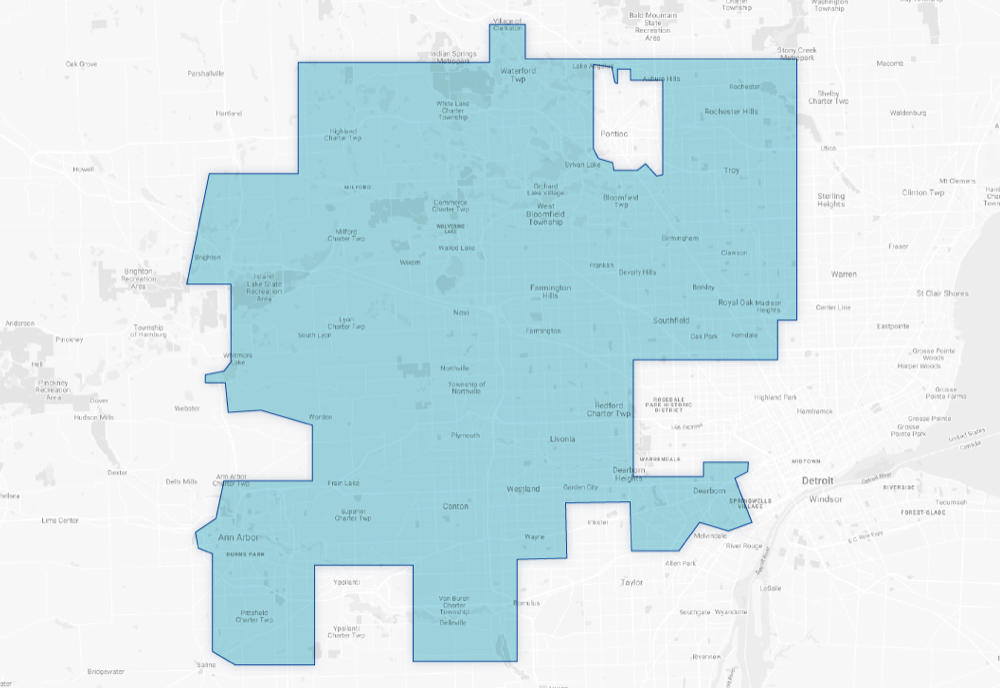Water heater installation in Farmington Hills, MI
Quality Water Heater Installations at Fair Prices, Always

Installations that put our customers first with…
- Upfront, flat-rate quotes
- At least 3 install options to choose from
- Qualified rebates filled out for you
- Same-day installations now available
Get expert advice with free water heater estimates! Whether you need a repair or replacement, we’ll help you find the best solution for your home.
PriceCost of a Standard Water Heater Installation in Michigan
- Low: $200
- Average: $800
- High: $4,000
- Low: $1,800
- Average: $2,500
- High: $3,500
Why such a wide price range?
Water heater installations are affected by several price factors, including:
Tank or tankless:
Tankless water heaters cost more than tank water heaters to install. They also tend to be more expensive to repair. But they can make up for it over time by lowering utility bills.Unit size:
The larger the tank, the more expensive the unit. This price factor still applies to tankless water heaters, which measures size in GMP (gallons per minute).Energy factor:
Both tank and tankless water heaters measure efficiency by the unit's energy factor. A higher energy factor increases unit investment, but reduces the monthly energy cost to use it.Warranty length:
Water heater warranties vary in length. The longer the length, the higher the up-front cost.
Cost of a Standard Water Heater Installation in Michigan
- Low: $200
- Average: $800
- High: $4,000
- Low: $1,800
- Average: $2,500
- High: $3,500
Why such a wide price range?
Water heater installations are affected by several price factors, including:
Tank or tankless:
Tankless water heaters cost more than tank water heaters to install. They also tend to be more expensive to repair. But they can make up for it over time by lowering utility bills.Unit size:
The larger the tank, the more expensive the unit. This price factor still applies to tankless water heaters, which measures size in GMP (gallons per minute).Energy factor:
Both tank and tankless water heaters measure efficiency by the unit's energy factor. A higher energy factor increases unit investment, but reduces the monthly energy cost to use it.Warranty length:
Water heater warranties vary in length. The longer the length, the higher the up-front cost.
ProcessYour Water Heater Install in 5 Easy Steps

1. Schedule your Comfort Assessment
Call (248) 644-7810 or use our handy online scheduling form to be put in touch with an experienced Thornton & Grooms Replacement Specialist, who will conduct a Comfort Assessment with you. Be sure to ask about our wildly popular, Michigan-made Bradford White water heaters.

2. Choose your comfort system
Your Replacement Specialist will sit down with you to review both tank and tankless water heater options. We'll give you at least three choices to pick from, and your final decision is always respected.

3. Get special pricing and financing options
Sometimes special pricing becomes available from the manufacturer for a particular unit. We check to see what rebates or discounts are available to you before we prepare our fixed-price quote. We also share low- and no-interest financing options with you upon request.

4. Install your new system
On the day of your installation (usually on the same day or day after your Comfort Assessment), you'll receive a text notification from your installer letting you know when they're on their way. As they get to work on the water heater, our team back at the office will process any system rebates.
Our post-installation process includes:
- Thoroughly cleaning our work space
- Walking you through the installation step by step
- Training you on how to use your new water heater

5. Take our brief survey
Every customer receives a survey by text message after their installation is complete. This is a great time to let us know how we did. If something went wrong, let us know and we'll do everything we can to make it right.
Your Water Heater Install in 5 Easy Steps
1. Schedule your Comfort Assessment
Call (248) 644-7810 or use our handy online scheduling form to be put in touch with an experienced Thornton & Grooms Replacement Specialist, who will conduct a Comfort Assessment with you. Be sure to ask about our wildly popular, Michigan-made Bradford White water heaters.
2. Choose your comfort system
Your Replacement Specialist will sit down with you to review both tank and tankless water heater options. We'll give you at least three choices to pick from, and your final decision is always respected.
3. Get special pricing and financing options
Sometimes special pricing becomes available from the manufacturer for a particular unit. We check to see what rebates or discounts are available to you before we prepare our fixed-price quote. We also share low- and no-interest financing options with you upon request.
4. Install your new system
On the day of your installation (usually on the same day or day after your Comfort Assessment), you'll receive a text notification from your installer letting you know when they're on their way. As they get to work on the water heater, our team back at the office will process any system rebates.
Our post-installation process includes:
- Thoroughly cleaning our work space
- Walking you through the installation step by step
- Training you on how to use your new water heater
5. Take our brief survey
Every customer receives a survey by text message after their installation is complete. This is a great time to let us know how we did. If something went wrong, let us know and we'll do everything we can to make it right.
Reviews
“Went above and beyond my expectations…”
Kevin B was absolutely OUTSTANDING...after 3 days without hot water I was totally frustrated Christmas week. Kevin arrived on time and installed our new hot water tank very quickly and professionally. He was very detailed as to his explanation what my new tank's specs were and its benefits. He left the install area very very clean and went above and beyond my expectations. Thornton & Grooms has just become my "go to" for all my future plumbing needs.
-Jim C.
We Care GuaranteeA Guarantee You Won't Find Anywhere Else.
We promise to provide our customers with 5-star service—no matter what. If you are not satisfied with our level of service at any point, we ask that you inform us so we can make it right before we leave your home.

We honor these guarantees for every water heater installation:
Professionalism
We are a team of skilled, knowledgeable professionals who undergo regular training to provide top-notch service and solutions at a fair cost.
Reputation
We truly care about providing 5-star service to our customers and our community. With thousands of Google reviews (we reply to each one!), it seems our customers agree.
Convenience
We know customers already have enough to deal with, so we offer friendly and convenient service from the first call to our post-service process.
A Guarantee You Won't Find Anywhere Else.
We promise to provide our customers with 5-star service—no matter what. If you are not satisfied with our level of service at any point, we ask that you inform us so we can make it right before we leave your home.

We honor these guarantees for every water heater installation:
Professionalism
We are a team of skilled, knowledgeable professionals who undergo regular training to provide top-notch service and solutions at a fair cost.
Reputation
We truly care about providing 5-star service to our customers and our community. With thousands of Google reviews (we reply to each one!), it seems our customers agree.
Convenience
We know customers already have enough to deal with, so we offer friendly and convenient service from the first call to our post-service process.
Service Area
- Ann Arbor
- Beverly Hills
- Birmingham
- Bloomfield Hills
- Farmington Hills
- Franklin
- Canton
- Garden City
- Livonia
- Novi
- Plymouth
- Rochester Hills
- Royal Oak
- Southfield
- Troy
- West Bloomfield
- Westland
- Northville
- Lake Angelus
... and many others.
See our full service area
